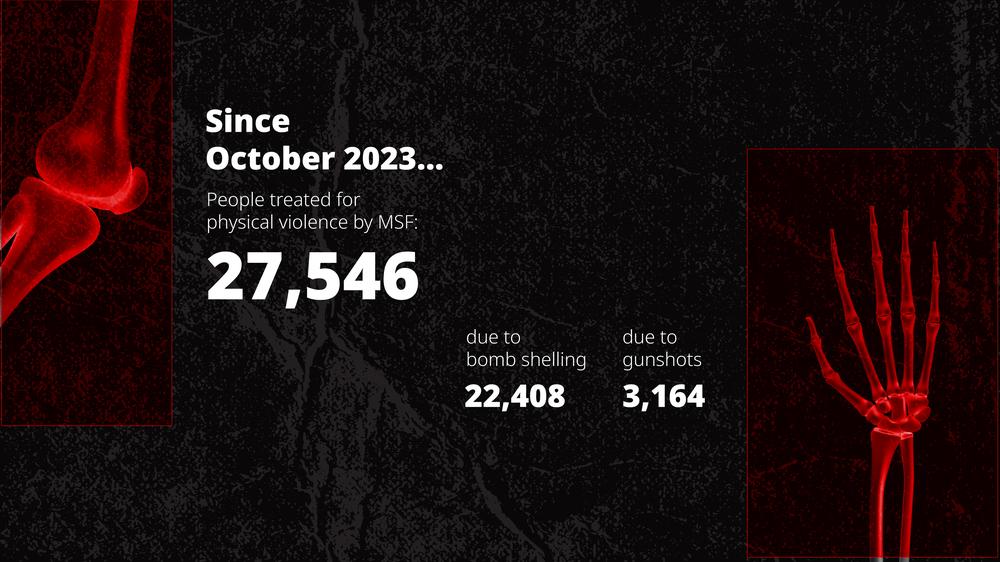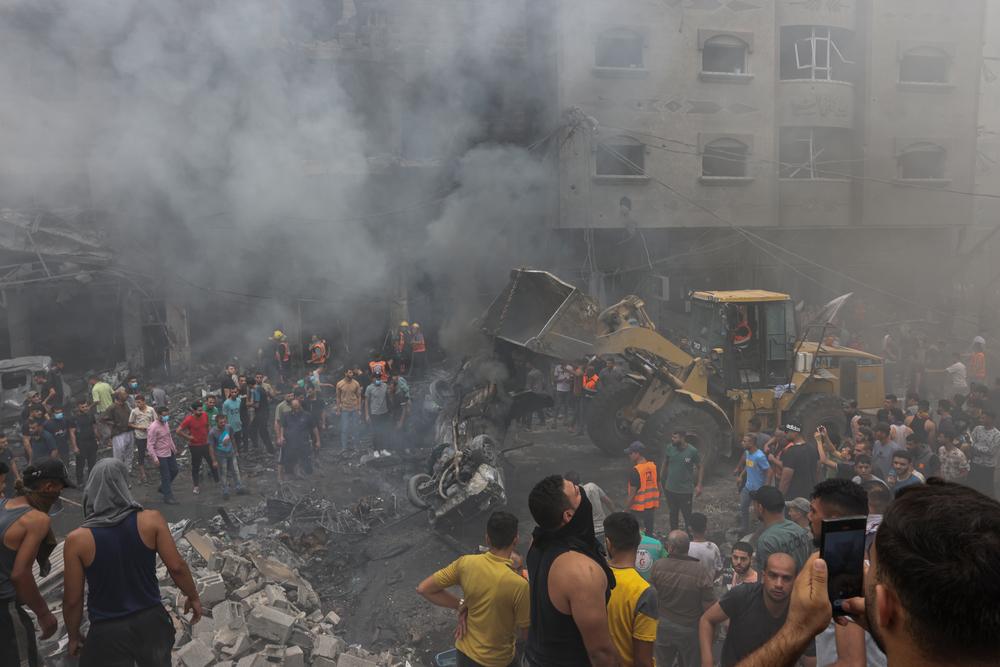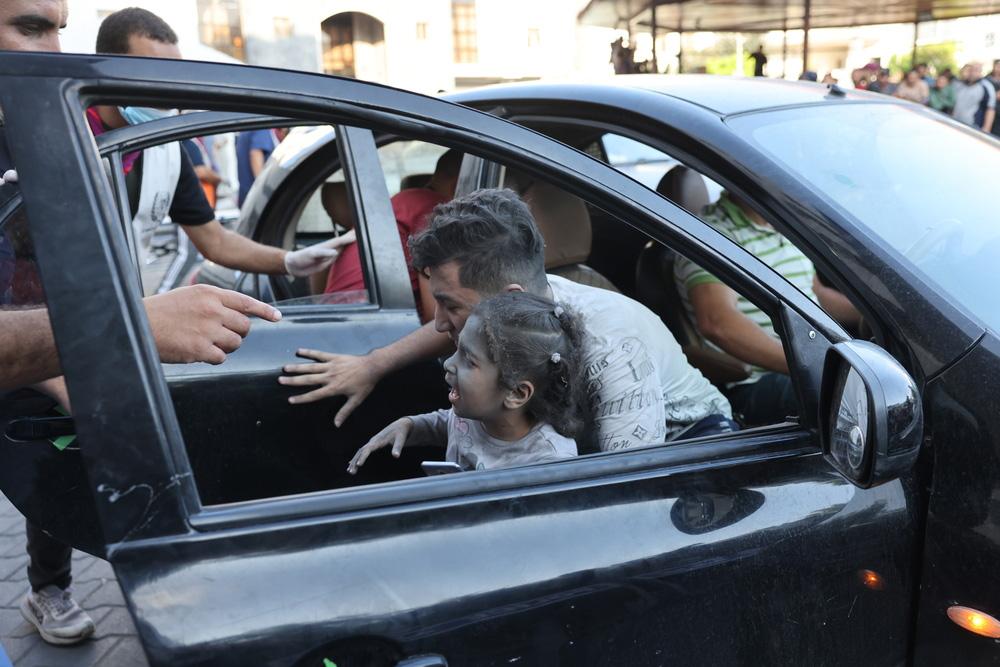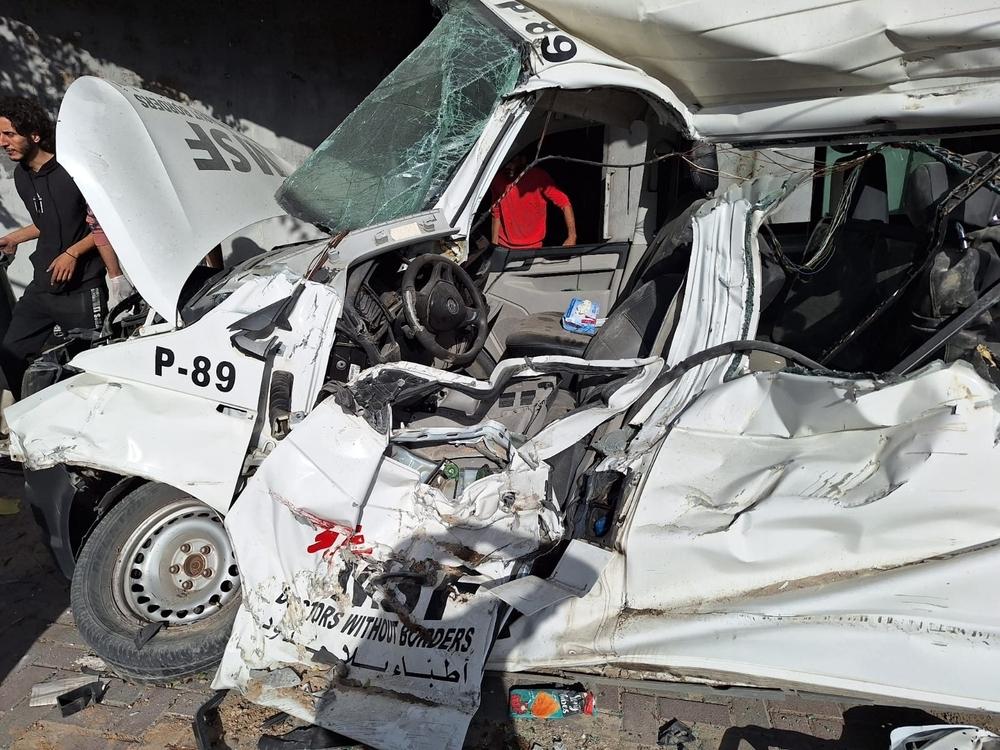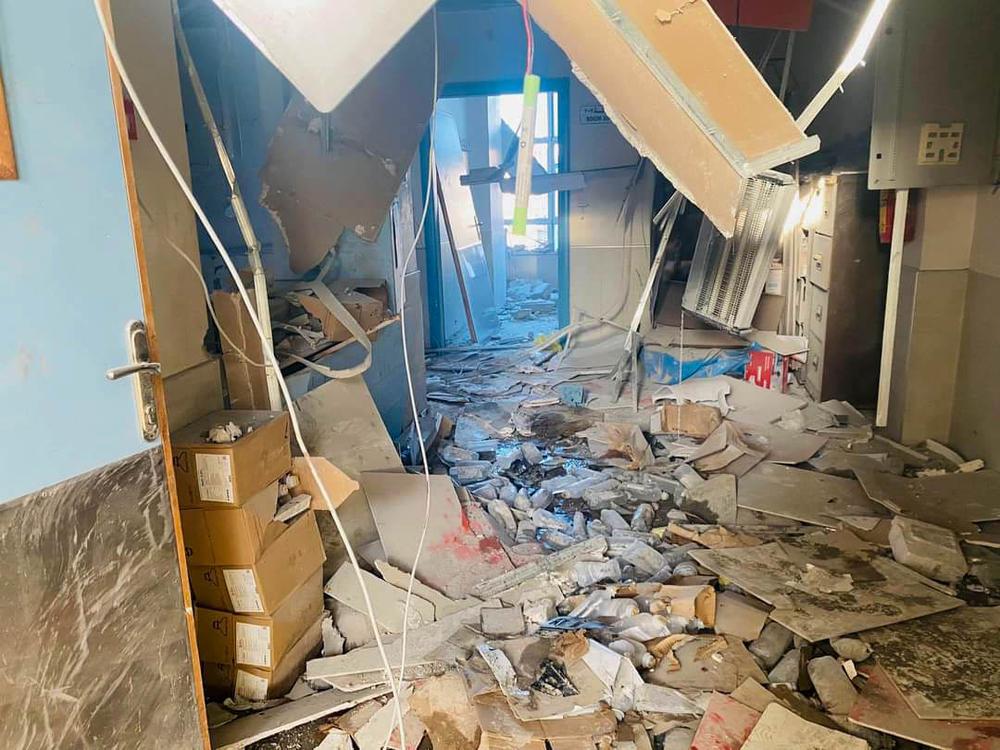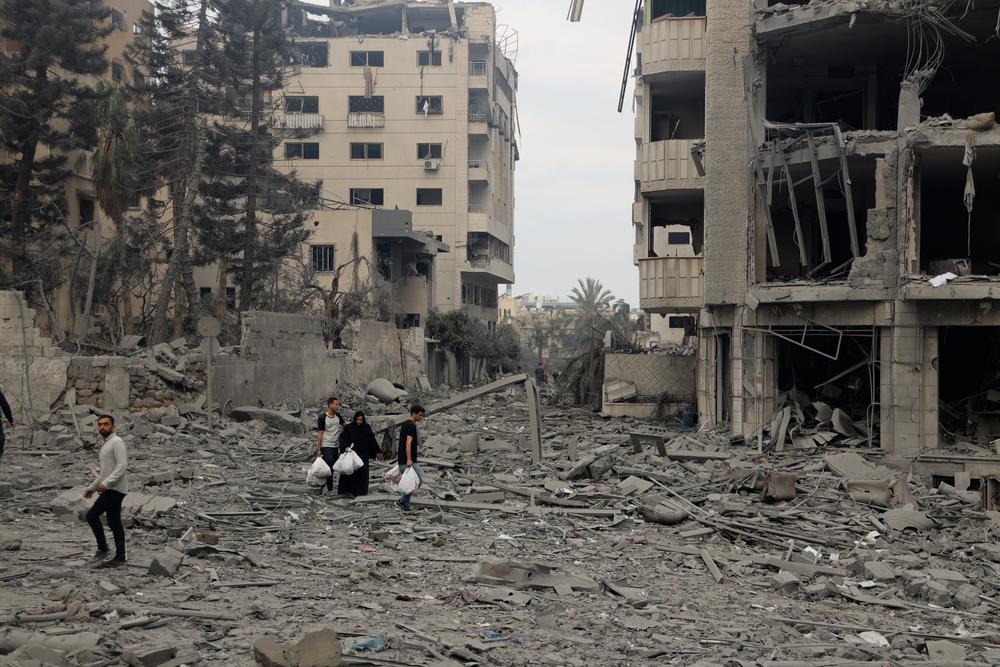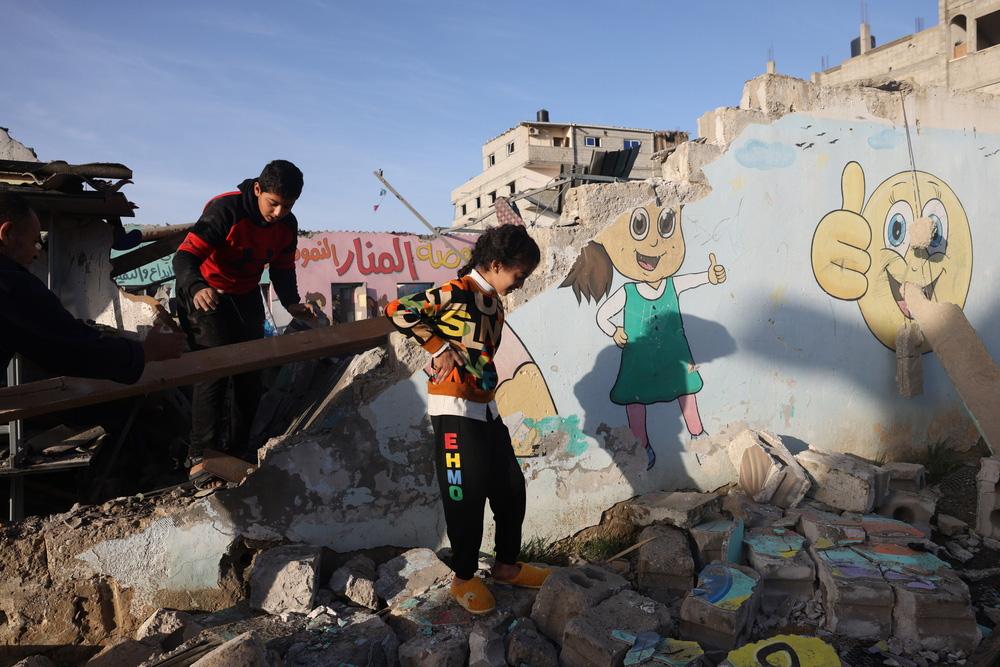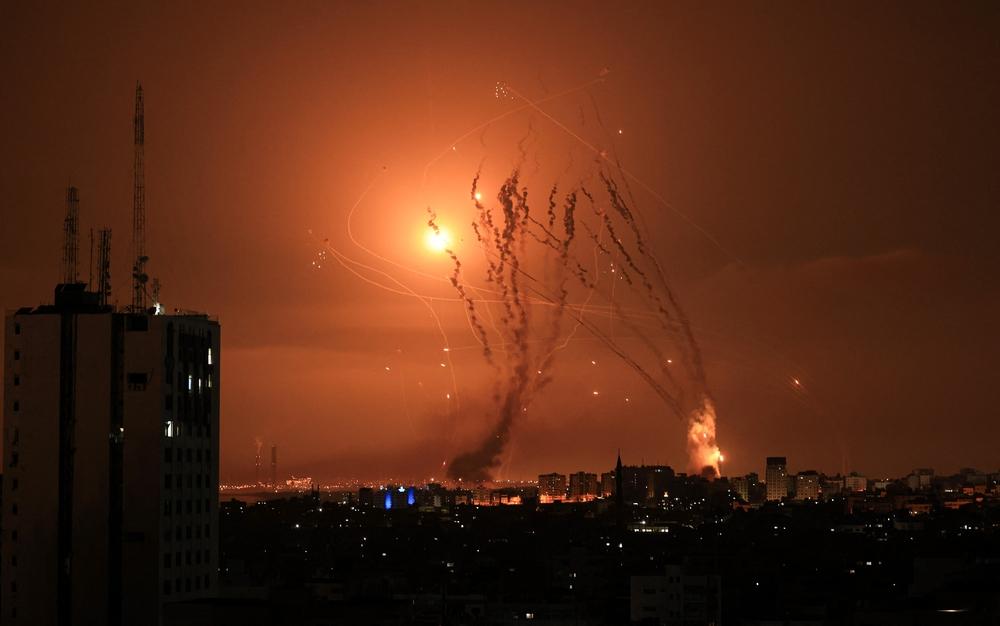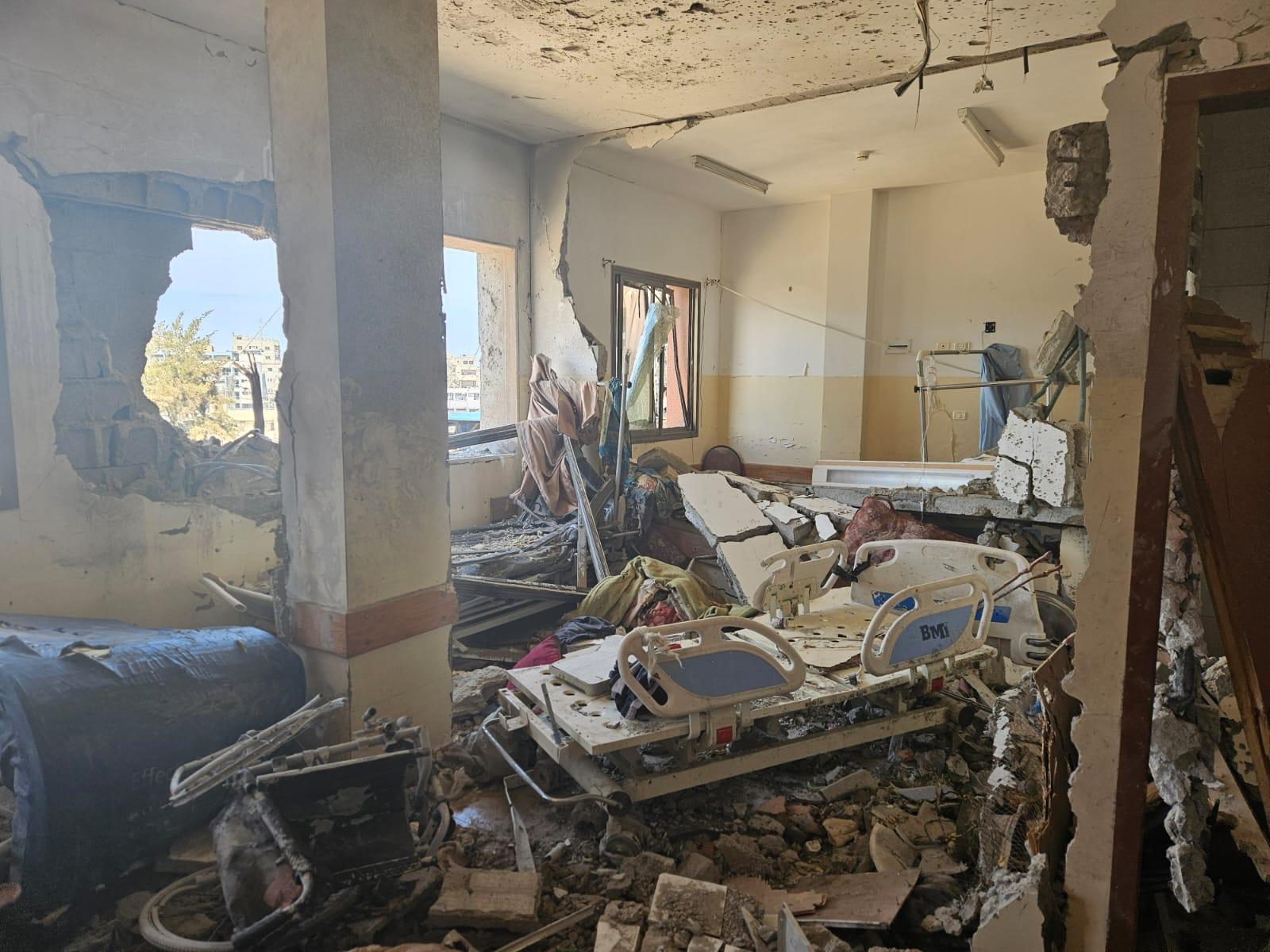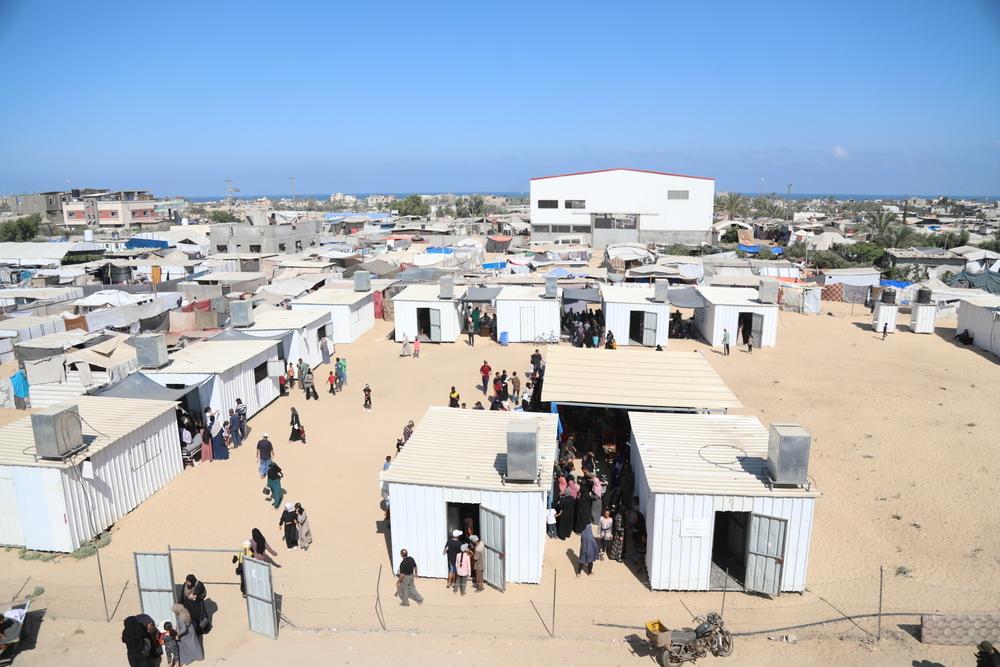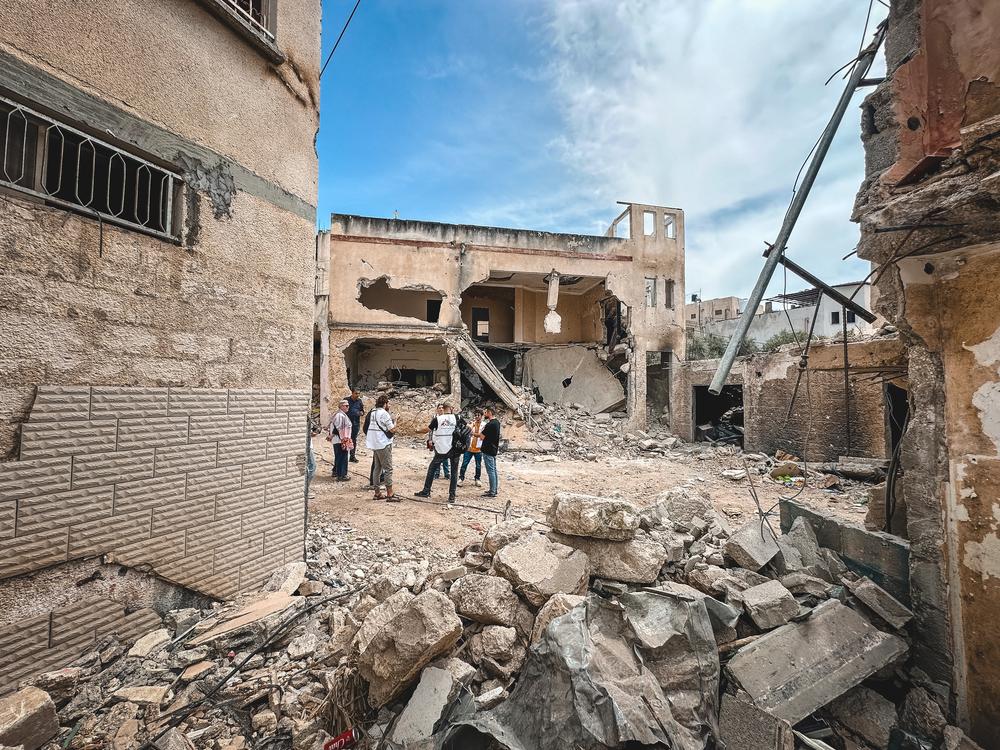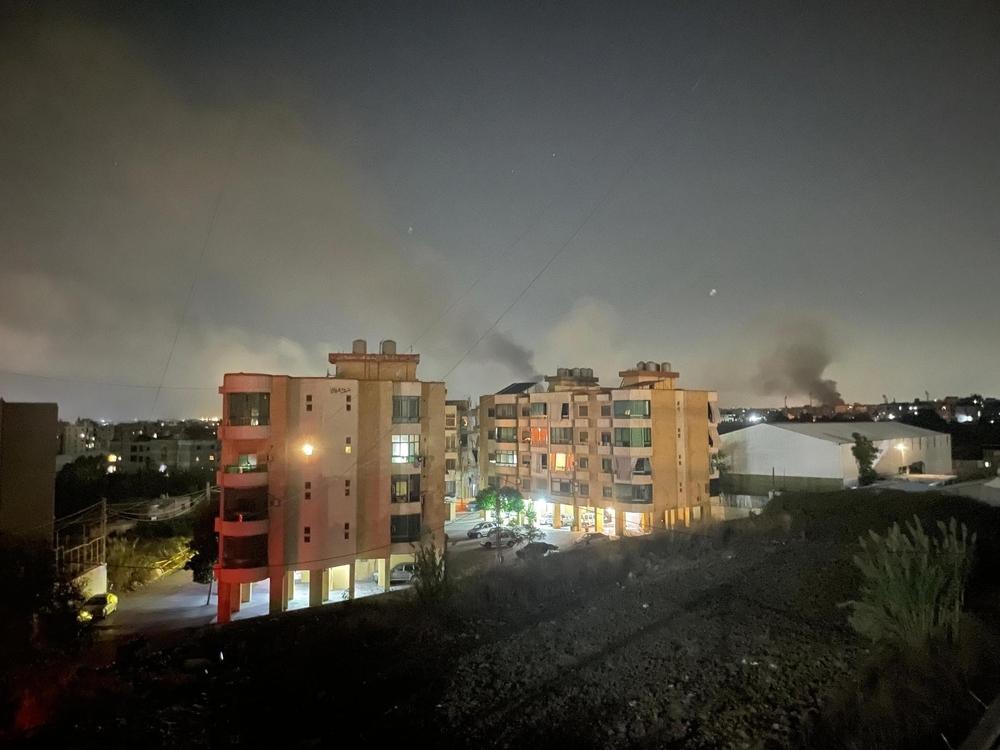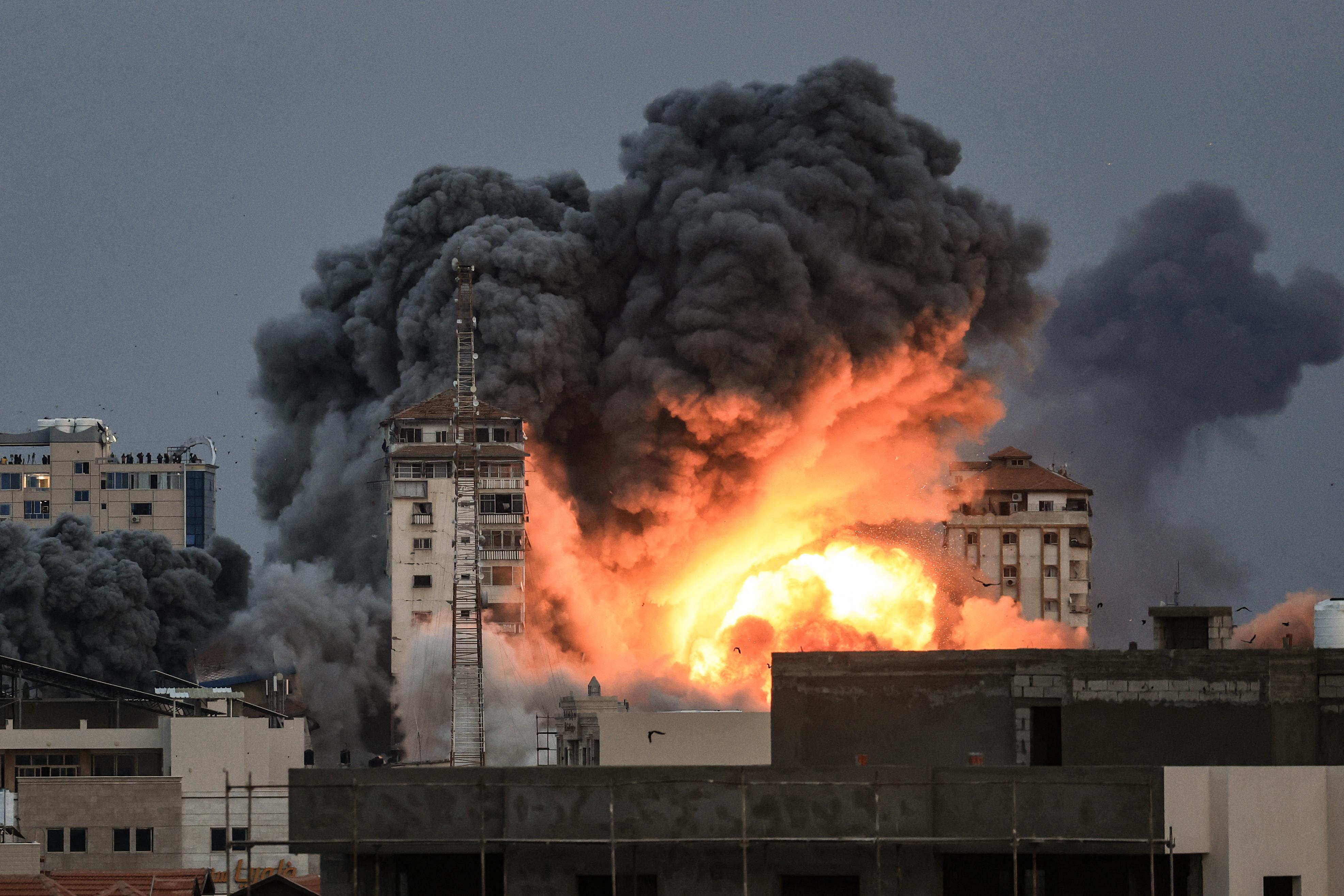
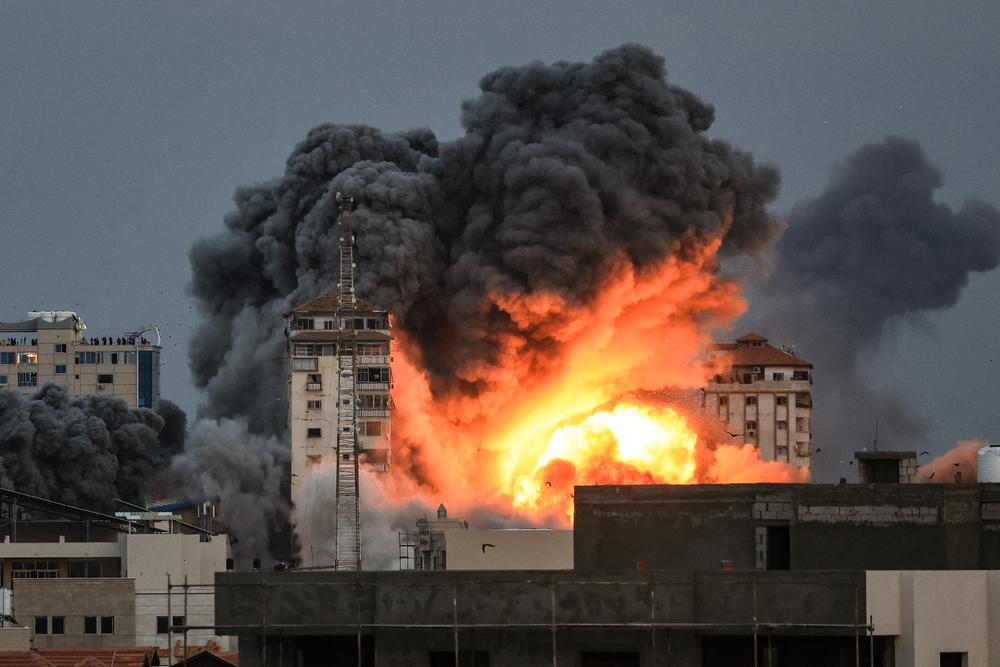
One Year of War, Decades of Pain
One year conflict in Gaza
For almost a full year now, Israel has carried out unmitigated slaughter in the Gaza Strip, Palestine.
A year has passed since the atrocities committed by Hamas on 7 October 2023 and Israel's all-out war response on the Gaza Strip. Over 41,500 people have been killed and over 96,000 wounded. As each day passes, more people have been repeatedly displaced and forced into negligible areas under bombardments and increasingly inhumane conditions.
People have lost their entire families, their homes and belongings, their livelihoods and sense of future, have witnessed and experienced an inhumane amount of violence and trauma, and have been displaced – often multiple times – as it has been the case for over 90% of the population. As each day passes without a sustained ceasefire, killings and suffering in the Gaza Strip continue - One year of conflict in Gaza.
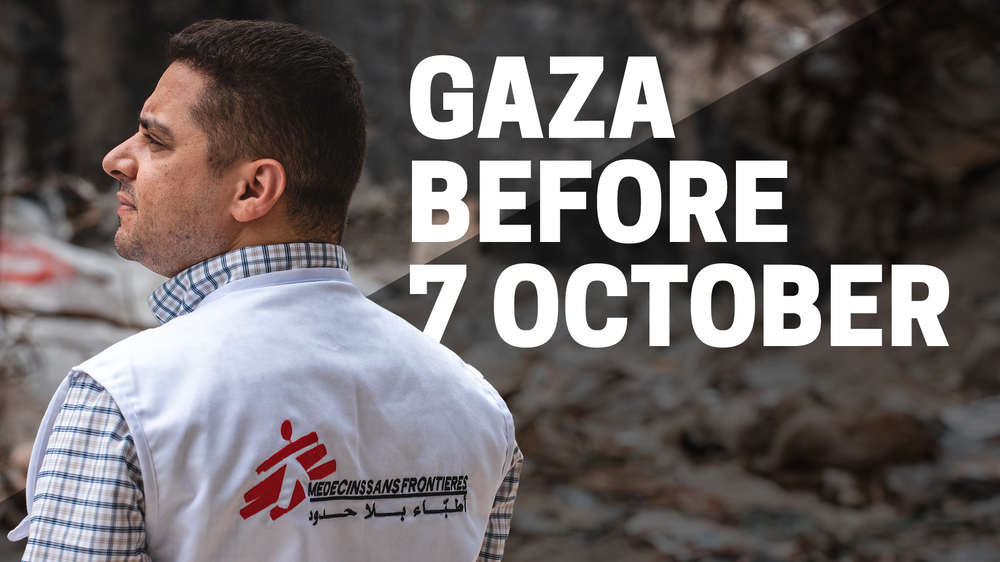
Gaza Before 7 October, 2023
One Year of War in Gaza: Timeline of Events
The population in Gaza has long been experiencing difficult living conditions and faced important humanitarian and medical needs that have only skyrocketed since the war started.MSF
Attacks on health care leave few medical options.
As medical needs grow exponentially, people’s options for care are shrinking. Israeli forces have committed widespread and systematic attacks on Gaza’s health care system and other vital civilian infrastructure. The healthcare system is now on the edge of collapse. Today, only 17 out of 36 hospitals are partially functional.
Warring parties have conducted hostilities near medical facilities, endangering patients, caretakers, and medical staff. Six MSF colleagues have been killed. From October 2023, staff and patients from MSF have had to leave 14 different health structures due to serious incidents and ongoing fighting. Thousands of people lose access to lifesaving medical care each time a medical facility is evacuated. This will have consequences on people’s health, not just in the immediate term but in the weeks and months to come.
The lack of humanitarian and medical supplies in Gaza compounds the lack of access to health care. Israeli authorities have routinely imposed unclear, unpredictable criteria for authorizing the entry of supplies. Once supplies cross into the Gaza Strip, they often do not make it to their destination due to an absence of safe and accessible roads, ongoing fighting, and looting of food and essential items. The first step in addressing this is for Israel to open vital land borders to ensure massive humanitarian and medical aid can reach those in need. The blockade on Gaza must end.
The blockade on Gaza must end to address overwhelming medical and humanitarian needs.MSF
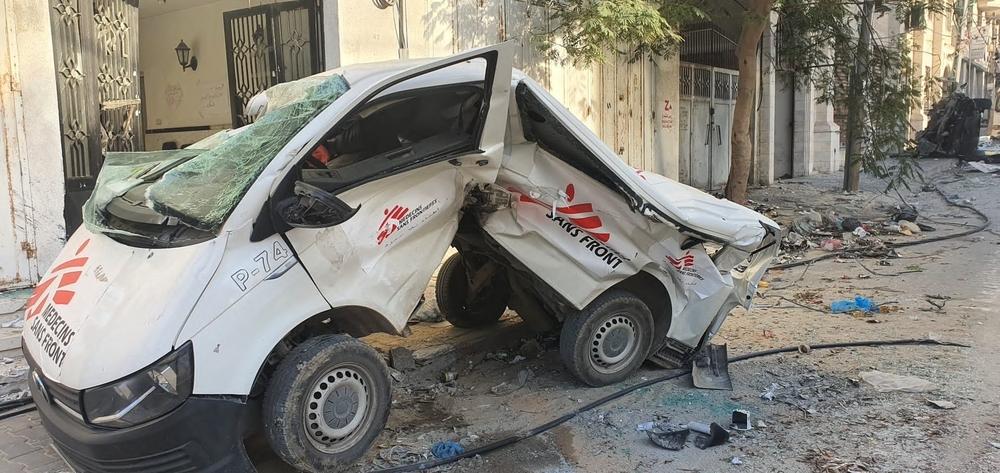
Remembering our colleagues killed in Gaza
msf.org.zaDoctors Without Borders (MSF) mourns the tragic loss of our colleagues who have been killed since the escalation of the war in Gaza in October 2023.
Read MoreGaza: Our Answers to Your Questions
The people of Gaza are deprived of basic necessities such as food, water, shelter, fuel and electricity, as well as health care, due to the inhumane siege imposed by Israel on the entire Gaza Strip, particularly on the north of the territory. So far, the supplies allowed into Gaza have been negligible compared to the ever-increasing needs, as the population is continually displaced by fighting and evacuation notices. Malnutrition is widespread, communicable diseases are spreading, and clean water is scarce, worsening the living conditions of the population.
Due to the lack of food supplies in the territory, the entire population of Gaza (approximately 2.3 million people) is affected by critical food insecurity, according to the IPC (Food Security Phase Classification Initiative). This is reflected in the emergence of cases of acute malnutrition, particularly among children. This amounts to consciously inflicting collective punishment on the population of Gaza, assimilated to a legitimate target.
In the current context of continuous bombardments by the Israeli army, civilians no longer have anywhere to take refuge. There is no "safe space" today for the Gazan population, 90% of whom have been displaced one or more times since the beginning of the conflict. At the end of August 2024, the "humanitarian zone" was decreed by Israel, the perimeter of which has changed several times in recent months due to the evolution of Israel's military operations, representing only 42 square kilometres, or 11% of the total area of the Gaza Strip.
The Israeli army has nevertheless bombed and struck this area, as it did in the attack on a building housing MSF staff in February 2024, with Israel declaring that it was targeting Hamas fighters.
Most hospitals are out of service, and those still able to provide care are doing so with great difficulty and limited access to medical supplies. The health system is in total collapse, as reports from local health authorities indicate over 40,000 deaths and 92,000 injuries as of August 16, 2024.
Since the beginning of the war, attacks on hospitals, ambulances and health workers have been systematic. According to the UN Office for the Coordination of Humanitarian Affairs (OCHA), between 7 October 2023 and 1 August 2024, 880 health workers were killed in the Gaza Strip and at least 310 were arrested. Currently, according to the WHO, only 16 hospitals, out of 36 existing in the Gaza Strip, are still partially functional and a total of 1,039 attacks have been recorded against health services.
MSF has no direct information that Hamas fighters are using hospitals in the Gaza Strip for military purposes. If we had been made aware of the presence of Hamas military bases and fighters in the hospitals where we work, we would not have maintained activities there for obvious reasons of responsibility and the safety of our teams. It is also important to understand that MSF teams only work or have worked in part of the large hospital complexes such as Al-Shifa and Nasser.
Furthermore, MSF has been working in the Gaza Strip for many years in coordination with the Ministry of Health, which is part of the Hamas Civil Administration. In Gaza, as in all our other intervention contexts, coordination with local health authorities is essential for the proper conduct of the association's interventions.
MSF would never knowingly employ anyone involved in military activities. Any employee linked to an armed group represents a danger to our staff and patients. Wherever we work, we ask our staff members to commit to respecting the MSF Charter, which includes respect for humanitarian principles and medical ethics.
On 26 June, Israeli authorities released information on social media about MSF employee Fadi Al-Wadiya, who was killed by Israeli forces on 25 June, accusing him of involvement in military activities in Gaza. Doctors Without Borders (MSF) is deeply concerned and takes these allegations very seriously. We did not indicate Fadi Al-Wadiya’s possible involvement in military activities. Although we have requested clarification from the Israeli authorities, we have received no formal response. MSF calls for full clarification of this assassination and believes that only an independent investigation will establish the facts. The strike that killed Fadi Al-Wadiya also killed four other people, including two children.
The way the Israeli authorities choose to communicate around this event further endangers our staff and contributes to discrediting medical and humanitarian workers in Gaza and the West Bank. Five more MSF staff have been killed in Gaza since 7 October without any formal response to our requests for explanations.
- An immediate and lasting ceasefire to prevent further deaths in Gaza and to restore and increase the flow of humanitarian aid on which the survival of the people of Gaza depends.
- Systematic attacks on health facilities and personnel must cease immediately. Hospitals, caregivers, ambulances and patients cannot be targeted.
- The delivery of humanitarian aid to the people of Gaza must not be hindered. Humanitarian aid to Gaza must be allowed unconditionally. We are seeing shortages of essential medical supplies in hospitals. There is an urgent need to facilitate the massive entry of medical equipment and medicines into the Gaza Strip. Before 7 October, between 300 and 500 trucks of supplies entered Gaza every day, where most of the population already depended on humanitarian aid. After a total blockade until 20 October 2023, never more than 240 trucks entered Gaza in one day, a quantity largely insufficient to meet the immense needs of the population.
- We also urgently call for the restoration of adequate and immediate access to clean drinking water for the population of the Gaza Strip.
- We call on all leaders and heads of state, including the United States, France, the United Kingdom, Canada, the European Union, the League of Arab States and the member states of the Organization of Islamic Cooperation, to exert all their influence on Israel to achieve a ceasefire and stop the ongoing massacre in Gaza. On 10 June 2024, after 247 days of war in Gaza, the Security Council adopted a resolution proposing a comprehensive three-phase ceasefire agreement to end the war in Gaza, urging Israel and Hamas to implement it fully, without delay and without conditions.
- We call for people who wish to flee to be able to do so. Doctors Without Borders (MSF) is asking that its Palestinian colleagues who wish to leave be evacuated, with the possibility of returning to Gaza at a later date.
MSF teams, made up of international and Palestinian staff, have been working in Gaza for 20 years, providing medical care and supporting the critically understaffed and under-equipped health system. Before the war broke out, our teams operated in three hospitals (Al-Shifa, Al-Awda and Al Nasser) and several outpatient clinics, providing comprehensive care to people suffering from burns and trauma. Since 2018 and the Israeli army’s brutal crackdown on the “March of Return” protesters, we have launched a reconstructive surgery programme in northern Gaza. However, MSF’s capacity to operate in Gaza is now severely reduced.
With its teams on the ground, MSF responded immediately after the start of the Israeli offensive on 7 October, donating medical supplies, trying to continue its existing activities (burns and trauma treatment, reconstructive surgery) and offering assistance to Gazan hospitals overwhelmed by the number of patients. However, the intensity of the Israeli bombardment quickly limited the teams’ ability to move around, assess needs and provide assistance. Over the months, MSF continued to adapt its interventions according to the evolution of the fighting, attacks on certain hospitals and the population's needs.
Several of our 700 Palestinian colleagues still work in MSF projects. As part of scheduled rotations, an average of around 30 international staff members carry out medical activities on site.
In the north
The clinic that MSF ran in Gaza City before the war near Al-Shifa hospital was heavily damaged in November 2023, making it impossible for us to carry out our activities on several occasions. Currently, the team is focusing on dressings and physiotherapy. Still, we are gradually increasing activities to provide a more comprehensive response that includes sexual and reproductive health, general medical consultations, screening for non-communicable diseases, and screening and treatment of malnutrition.
In the center
MSF began working at Al-Aqsa Hospital on 26 November 2023. On 6 January 2024, MSF had to evacuate the hospital due to the fighting occurring all around it. On 7 February, basic medical activities resumed, such as dressing and rehabilitation of wounded patients. Since then, the team has resumed providing acute trauma surgery, post-operative wound care, physiotherapy, health promotion and mental health support.
On Saturday, 24 August, the frontline quickly approached Al-Aqsa Hospital. The following day, an evacuation order issued by Israeli forces and an explosion approximately 250 metres from the hospital caused the vast majority of the 650 patients and hundreds of people who had sought refuge there to flee the hospital. Today, the hospital is almost unrecognizable, and MSF has had to rush to open a field hospital in Deir Al Balah.
On 10 March, an MSF team began an activity treating injuries and screening for malnutrition at the “Martyrs” primary health centre in Deir Al Balah.
In mid-April, MSF opened a new primary healthcare centre in Al Hekker to provide outpatient services, including general consultations, vaccinations, sexual and reproductive health services, dressings, and mental health services, including psychological first aid. By May, the team carried out an average of 250 consultations daily.
In the south
Nasser Hospital is now the largest surgical centre in Gaza, with Al-Shifa Hospital no longer functioning. In mid-February 2024, MSF staff were forced to flee and leave patients behind after a shell hit the hospital, and Israeli forces ordered the facility evacuated before storming it.
In mid-May, working with the Ministry of Health, MSF restarted operations in Nasser, focusing on orthopaedic surgery and the burns unit. The maternity, neonatal intensive care and paediatric wards started on 25 May. We now operate with 68 intensive care beds and have opened a wound care ward, providing dressings and physiotherapy for burns and trauma cases. We also run a day surgery ward (3 days/week) for patients requiring minor procedures under anaesthesia.
Between May and June 2024, MSF opened two primary healthcare centres in Khan Younis and Al Attar. MSF provides medical consultations, vaccinations, mental healthcare, outpatient treatment for malnutrition, sexual and reproductive health services, wound care, physiotherapy and health promotion. Given the massive influx of people from Rafah into an already overcrowded humanitarian area, and the lack of health facilities to cover trauma needs, MSF is exploring the possibility of including an emergency service focused on stabilization and referral of the most complex cases.
In January 2024, MSF set up a mobile primary healthcare clinic in Al-Mawasi. Our teams provide outpatient services, including general consultations, vaccinations, sexual and reproductive healthcare, dressings, mental health, and health promotion services. The health centre includes a 24/7 emergency room to stabilise and refer trauma patients.
MSF also partners with the local CFTA (Culture and Free Thought Association) in a health centre in Al Mawasi. MSF provides general consultations, treatment of non-communicable diseases, screening and treatment of malnutrition, dressings, physiotherapy, pre-and post-natal care, and sexual and reproductive health care.
The most common illnesses and injuries seen among patients in Al-Mawasi are upper respiratory infections, acute diarrhoea, skin diseases and hypertension.
Currently, MSF distributes over 600,000 litres of clean water per day, obtained through the desalination process in over 40 water points in Al Mawasi, Khan Younis, Rafah and Deir El Balah. We are continuously working to increase this amount. A desalination unit in Al Mawasi also provides 30 m3 of clean water daily. A second unit is planned in Deir el Balah, with an expected delivery of 70 m3 per day, and is expected to be operational by mid-September. Access to clean water is severely lacking following the destruction of infrastructure, repeated displacement, fuel shortages, etc.
MSF also carries out activities through Palestinian NGO partners such as PARC (Agriculture Development Association), CFTA (Culture and Free Thought Association) and PalMed.
During the first weeks of the war, and following calls from the Israeli army for the population to leave the northern Gaza Strip, the international team and a large part of the Palestinian MSF staff already present in Gaza before October 7 moved to the south of the enclave.
MSF’s 22 international staff members arrived in Egypt via the Rafah border crossing on 1 November. A new MSF team of 15, including a specialist medical team, entered the Gaza Strip on 14 November and resumed activities in the south of the territory. Since then, an average of around 30 international staff members have been present in Gaza as part of scheduled rotations.
We still have some 700 Palestinian colleagues in the Gaza Strip. We are trying to support them and ensure their health and safety. However, communication difficulties due to power and network outages mean we cannot stay in touch with all of them. Some have moved south, and others have remained in the north to continue providing care where possible. Still, others are trapped at home with their families due to the ongoing insecurity.
Since 7 October, we have mourned the deaths of six colleagues. Mohamed Al Ahel, who had been a laboratory technician for MSF for two years, was killed along with several members of his family on 6 November while he was at home in the Al Shate refugee camp when the area was bombed.
On 21 November, two MSF doctors were killed in a strike at al-Awda Hospital: Dr Mahmoud Abu Nujaila and Dr Ahmad Al Sahar.
On 18 November 2023, Alaa Al Shawa, a volunteer nurse working alongside MSF teams at Al-Shifa hospital, and another family member of an MSF employee died after an attack on an MSF convoy of MSF staff and their families, 137 people in total, who had been stranded for a week without food or water at the MSF compound near Al-Shifa hospital and were trying to reach the southern Gaza Strip.
Reem Abu Lebdeh, a member of the MSF UK board of directors and a former MSF employee in Gaza, was believed to have been killed in December 2023 along with members of her family during the Israeli offensive in Khan Younis.
Fadi Al Wadiya, a doctor, physiotherapist and father of three, was killed on 25 June while cycling to work at the MSF clinic.
With Gaza under total siege, residents, including MSF staff, have nowhere to go to escape the bombardment. Conducting intensive bombing campaigns in a landlocked and densely populated environment means assuming a very high level of civilian casualties. Local health authorities report more than 40,000 deaths and over 92,000 injuries as of 16 August 2024.
MSF plans to maintain its humanitarian intervention in Gaza, where some 700 of its Palestinian staff are present and will continue to assess the security situation and the risks faced by its teams daily, as it has done since the beginning of this war.
Areas under a so-called “deconfliction” mechanism have been subject to constant violations and are unreliable. Attacks by Israeli forces on aid workers and medical facilities have been carried out with impunity.
The tragic killing of seven World Central Kitchen (WCK) aid workers by the Israeli military on 1 April in Gaza, in a marked convoy, is unfortunately not an isolated incident. Israel has shown a deliberate and repeated disregard for medical and humanitarian missions. More than 287 other aid workers have been killed in Gaza, including six members of MSF teams.
Yet the medical and humanitarian needs in Gaza are overwhelming, and concerted attempts to cripple key humanitarian providers, such as UNRWA, have received tacit support from several states internationally.
MSF teams in Gaza are facing severe shortages of essential medicines and equipment. We face significant constraints in renewing our stocks as the Gaza Strip is under siege.
We have a rear base in Egypt to facilitate the transit of our international supplies, and we have an emergency supply team based in Amman, through which we are trying to send supplies to Gaza. By the end of June 2024, MSF had delivered seven international shipments, 73 trucks, to Gaza through the United Nations.
The closure of the Rafah border crossing following the Israeli offensive in southern Gaza in early May, combined with extremely strict controls based on opaque criteria, has significantly congested the flow of humanitarian aid through the Kerem Shalom entry point. This has resulted in massive queues of trucks and significant delays in delivering humanitarian aid through the Gaza Strip. Even when aid is finally able to enter the Gaza Strip, fighting and insecurity, including looting of trucks, often prevent humanitarian organizations from delivering it to where it is desperately needed.
MSF is calling for humanitarian aid to be delivered to Gaza as urgently as possible.
Israel has announced, during this war, as in previous ones, that it will systematically warn by text message, via social networks, by telephone, or other means of communication, the inhabitants of a neighbourhood that is going to be bombed. However, we have noted that this is not always the case. And even if alerts continue to be broadcast by the Israeli authorities, they are difficult to access for the inhabitants of Gaza: due to frequent power and network cuts, the use of mobile phones and any other means of communication remains extremely limited.
Generally speaking, such messages leave very little time for people to flee. Conducting intensive bombing campaigns in a landlocked and densely populated environment means assuming a very high level of civilian casualties. This is, in effect, indiscriminate bombing.
There is currently no safe place for civilians in the Gaza Strip. MSF urgently calls for a ceasefire and the definition of safe and bomb-free locations in the Gaza Strip.
MSF is not involved in negotiations for the release of hostages, either in Gaza or anywhere else in the world. This activity is part of the mandate of the International Committee of the Red Cross and Red Crescent.
We understand the emotion and anguish of the families of the hostages. We call on all parties to the conflict to spare the civilian population wherever they are. On 18 October 2023, MSF also signed this petition , calling for an immediate ceasefire in the Gaza Strip, and also for the release of the hostages.
Our communication on the Israeli-Palestinian conflict is based - as everywhere else in our areas of intervention - on the direct testimony of our staff on the ground, of the people to whom we provide aid, and of their entourage. We testify to what we observe and note where we intervene, and we publicly express our appeals and requests to the belligerents, to political actors, and to other aid actors.
The testimonies we collected from our medical staff outline what amounts to an assumed military strategy targeting healthcare facilities, based on the argument that they would be used as military structures by Hamas – something that MSF teams did not directly witness.
During the first months of the war, in the northern Gaza Strip, in the hospitals of Al-Shifa, Al-Quds and Al-Nasser, where MSF staff were operating, the method applied by the Israeli army consisted of heavily shelling the areas around the healthcare facilities, making it impossible to transfer patients and access the wounded and civilians seeking care and protection.
It then surrounded the healthcare facilities with its ground assets and ordered their evacuation, even though shooting and active fighting continued in the surrounding area. Patients, civilians and medical staff were deliberately targeted while they sometimes tried to escape as they had been ordered. The hospitals themselves have also been hit by gunfire.
Medical staff have often faced an impossible choice: to save their lives or the lives of their patients. We cannot establish the origin of every shot or attack on these hospitals. But we do know that some attacks are clearly attributed to tanks, which only the Israeli army has. Furthermore, we see that the military strategy applied is similar from one hospital to another.
MSF takes any allegation of antisemitism extremely seriously. At any given time, MSF has approximately 68,000 people working in our projects and headquarters. Any form of bigotry or discrimination by MSF staff is unacceptable. We do not believe that criticism of Israeli government policies is equivalent to antisemitism. MSF speaks out when governments or actors implement policies that are harmful to the health and safety of our patients or staff. The way Israel is prosecuting this war is causing massive death and suffering among Palestinian civilians and putting our staff at risk. No state is above criticism.
As humanitarians, we grieve for all civilian lives lost, and the vast majority of the victims of this conflict are civilians, including many elderly people, women, and children. Violence against civilians is never justified, and ALL civilians deserve protection.
People treated for physical violence since October 2023
